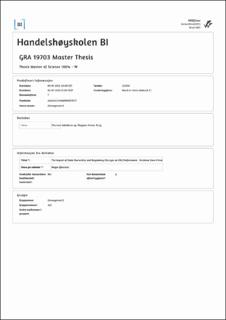| dc.description.abstract | In this study, we explore the dynamic relationship between state ownership and
ESG performance in Chinese firms, focusing on the impact of the 2018 Corporate
Governance Code and the different ESG Category scores. Our longitudinal
analysis spans eight years (2015-2022) and includes 193 firms, 63 of which are
state-owned. Our findings indicate that, despite generally lower ESG performance
by SOEs compared to non-SOEs, the implementation of the 2018 Code ushered
in a significant shift. Notably, non-SOEs demonstrated a more pronounced uplift
in ESG performance post-regulation. While we identified prevailing positive
ESG trends across all firms, the regulation’s specific impact requires further
exploration. This study sheds light on the role of regulatory changes in steering
ESG performance, offering meaningful insights from the unique Chinese context
where state ownership and regulatory shifts are significant determinants. | en_US |
